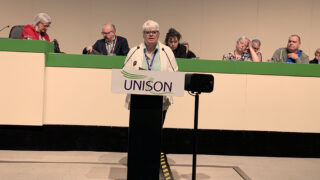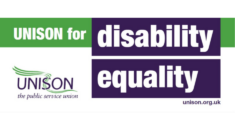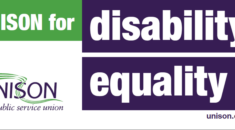When UNISON launched its Us Too campaign this year, inviting members to speak out about their experiences of sexual harassment, many revealed harassment they had experienced at work Christmas parties.
One anonymous member shared her story. “At our team Christmas do last year, my then manager deemed it acceptable to address my eating disorder and state that ‘despite the eating disorder, he would still have a go on me’. He was very touchy with all staff, and I had been told by other staff that ‘this is just how he is’.
“To say I was horrified and scared is an understatement. This completely threw me and I froze and felt too scared to speak out.
“I addressed this with the senior manager, who talked me out of raising a grievance and instead moved me into a different team. Although moving teams has helped me feel comfortable, as my current manager is a fantastic support, I feel utterly let down in the way this situation was dealt with.”
UNISON believes that all people have the right to dignity at work, which sexual harassment clearly violates.
The union’s women’s officer, Josie Irwin, commented: “Work Christmas parties can have a dark side. What should be a celebration with colleagues can become an ordeal of sexual innuendo, inappropriate advances, groping and harassing behaviour that threatens your dignity.
“Employers should ensure everyone knows the party is an extension of work and the same rules apply – sexual harassment is not acceptable and disciplinary action will be taken if it occurs. However, there is also a responsibility on would-be perpetrators – just don’t do it!”
What is sexual harassment?
Sexual harassment is unwanted conduct of a sexual nature.
It has the purpose or effect of violating the dignity of a worker, or creating an intimidating, hostile, degrading, humiliating or offensive environment for them.
Something can still be considered sexual harassment even if the alleged harasser didn’t mean for it to be. It also doesn’t have to be intentionally directed at a specific person.
Sexual harassment can happen in any number of ways, including:
- written or verbal comments of a sexual nature, such as remarks about an employee’s appearance, questions about their sex life or offensive jokes;
- displaying pornographic or explicit images;
- emails with content of a sexual nature;
- unwanted physical contact and touching;
- sexual assault.
Another member who shared her experience said: “The worst harassment I have experienced in the workplace was when I worked for a private company in London. During the Christmas do my married manager got drunk and made verbal advances. He also put his hand around the back of my neck and tried to ‘steer me’.
“At the same party, a lower-level employee said something so vile I’m not going to repeat it, and asked me what my nipples looked like. He also came right into my personal space. Under the guise of jokiness I lightly pushed him back to make the point, and he became aggressive and told me not to be rude. I felt intimidated and ashamed, so apologised to him.”
Four out of five (79%) women who have been sexually harassed at work do not feel able to report it to their employer – meaning harassment continues unchecked in workplaces across the UK.
This figure shows that the existing structures for dealing with sexual harassment are not working for the women who experience it.
Another anonymous local government member’s story demonstrates how the decision to report is often weighted with the fear of consequences, or not being believed or taken seriously.
“Last year there was a Christmas ball at my place of work,” she told us. “There was a band, a disco, and one of those photo booth set-ups.
“A male colleague of mine, who I’d previously been on friendly terms with – not friends as such, just exchanging friendly pleasantries during the working day – came up to me halfway through the night and suggested we get our photos taken in the booth.
“I never gave it a second thought, I knew he was married and he knew I was in a long-term relationship. I’d already been in the booth with other people too.
“Inside the photo booth, I was standing in front of him as I was dealing with the on-screen display to start the photo-taking process off. It was then that he groped my bum from behind. This was no ‘his hand just happened to brush past me’, this was a definite squeeze.
“I was so shocked that he’d been so stupid to have pulled a stunt like that, especially with #MeToo having been so prominent in the media for a long time.
“Everyone had been drinking, but he was nowhere near the stage where he didn’t know what he was doing. And there was no way I was giving off any signals he could have misconstrued as up to that point I’d only spoken to him in the company of our other colleagues.
“Before that point, I would have said that if any man had pulled a stunt like that at work – because this was a party on work’s premises, organised by our employer – I would have raised hell. But I didn’t.
“I think because it was a party situation and we were in the company of our colleagues I didn’t want to make a fuss and put a dampener on what had been up to that point a good night. So I just said ‘Hey!’ in a jokingly warning manner, posed for the photos and left the booth. I immediately sat back at our table and confided in two of my friends what had happened but swore them to secrecy.
“I knew immediately that I wasn’t going to raise a formal complaint, but I wanted to say what had happened to me straight afterwards to a few people I could trust, so that if anything later came out about him I had people who could back up that I had said I experienced something similar in the past also.
“What stopped me from reporting the incident was that it would have been my word against his,” she continued. “I had no real proof that he’d done anything to me inside that photo booth, and it didn’t seem a serious enough thing to make a fuss over.
“But a greater factor was that he shared a small office with, and was good friends with the boss. And the director of the whole department would pop his head into their office a few times a week to talk about work and football with him. How could I speak up against someone who was three grades higher than me and was friendly with my whole line management?”
UNISON believes that nobody should ever have to experience this, especially not in their place of work. And nobody should get away with harassing a colleague.
Workplace sexual harassment is a structural problem that needs structural solutions. That’s why UNISON is calling for an additional clause in the Equality Act to make it mandatory for employers to demonstrate that they are proactively taking steps to stop sexual harassment taking place.
And earlier this year, the union joined the ‘This Is Not Working’ alliance of unions, charities and women’s organisations who are lobbying the government and employers to focus their attention on preventing sexual harassment, not just waiting for incidents to happen and then responding.










